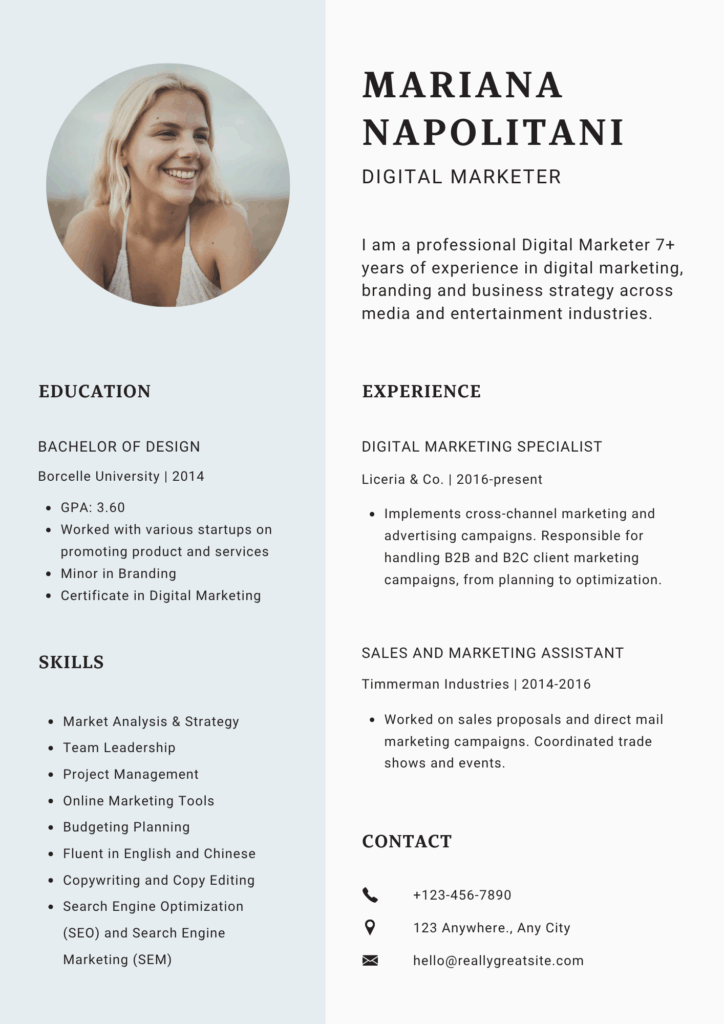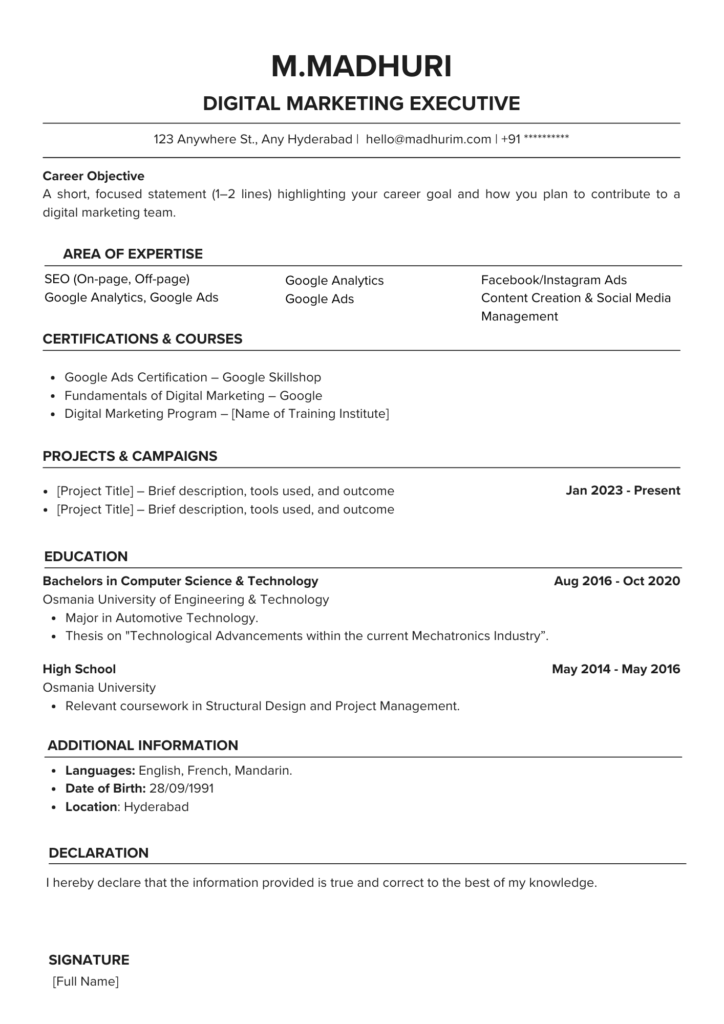How to Create a Digital Marketing Resume That Gets You Hired

Your digital marketing resume is more than just a list of skills and jobs. It’s the way you show who you are, what you can do, and how you think about solving real problems. Hiring managers want to understand how you approach challenges, what you’ve learned so far, and how you can grow on the job.
Even if you’re new to the field, the right resume can help you stand out by telling your story clearly and honestly. Writing a resume this way takes time, but it’s worth the effort when it gets you closer to the opportunity you want.
Table of Contents
ToggleWhat to Include in a Strong Digital Marketing Resume
Apart from personal details and educational qualifications, a strong digital marketing resume must include relevant certifications and courses in Digital Marketing to prove your knowledge, and details of any projects or campaigns you’ve worked on to demonstrate real-world application.
Here is a detailed breakdown of the key sections of a digital marketing resume.
Resume Objective
The Resume Objective section is a brief statement at the top of your resume that outlines your career goals and how your skills align with the job you’re applying for.
Instead of vague or generic statements, use the resume objective section to connect the needs of the role you are applying for with your specific goals and skillsets.
A focused objective shows recruiters that you understand the position and are motivated to contribute meaningfully from the start.
Pro-Tip: Customize this section for every different company you apply for by aligning it to the Job Description.
Skills Section
This skills section of a digital marketing resume should be a mix of hard skills, like tools proficiency, and marketing strategies you understand. Clear, relevant skills show that you’re prepared to handle the tasks the job requires and stay up to date with industry trends.
Some example skills that you can mention in your resume:
- Proficiency in digital marketing tools such as Google Analytics, SEMrush, and Facebook Ads Manager
- Understanding of SEO fundamentals including keyword research and on-page optimization
- Experience with content creation and social media management across platforms like Instagram and LinkedIn
- Knowledge of email marketing techniques and automation tools like Mailchimp or HubSpot
- Ability to analyze campaign performance and optimize based on data-driven insights
Certifications and Courses
Certifications and courses add credibility to your resume, especially if you’re starting out or switching careers. They show that you’ve taken the initiative to learn and stay updated with industry practices.
Platforms like Google’s Skillshop offer free certifications in areas like Google Ads, Analytics, and Search, which are highly regarded by employers.
Completing courses from a reputed digital marketing training institute can also strengthen your profile by providing structured learning and hands-on experience. Make sure to list only those certifications that are relevant to the job you’re applying for.
Projects and Campaigns
The Projects and Campaigns section is where you prove your skills with real or simulated work. Recruiters want to see how you apply your knowledge to solve actual problems or achieve measurable results. Even if you haven’t worked with a company, personal projects, freelance gigs, or campaigns done during training can be included in your resume.
Example of what kind of projects you can include:
- Created a 30-day Instagram content calendar for a local brand, resulting in a 45% increase in engagement.
- Ran a Google Ads campaign with a limited budget, achieving a 3.5% CTR and optimizing for conversions.
- Built a personal blog and implemented SEO strategies that ranked multiple pages on the first page of Google.
- Managed email marketing campaigns using Mailchimp, with an average open rate of 28%.
- Designed and executed a mock product launch strategy as part of a digital marketing training program.
Note: Standard sections like personal details and education can follow the usual resume format. However, make sure the key sections discussed above, such as the objective, skills, certifications, and project experience, convey your digital marketing capabilities clearly.
Digital Marketing Resume for Freshers
If you’re starting out with little to no formal experience, your resume should focus on potential, not just history. Highlight what you’ve learned, what tools you’ve practiced with, and how you’ve applied your skills, even in personal or academic projects.
Employers aren’t expecting years of experience from a fresher, but they are looking for curiosity, initiative, and a willingness to learn. Use your resume to show that you’re serious about the field and already on your way to becoming a capable contributor.
Digital Marketing Resume Sample
A digital marketing resume sample provided here can be used as a reference to understand how to structure your own. It helps you see what information to include and how to present your skills effectively. However, don’t copy it word for word. Every resume should reflect your own experiences and strengths.
For best results, get feedback from career counsellors, seniors in the industry, or your digital marketing training institute. They can help you make sure your resume aligns with current expectations and the specific role you’re applying for.

Digital Marketing Resume Template
Building a resume from scratch can be confusing and overwhelming, especially when you’re new to the industry. Use this digital marketing resume template as a starting point and customize it based on your skills, training, and the roles you’re applying for. Keep the layout clean, the wording honest, and the structure consistent.

Role-Specific Resume Tips
A one-size-fits-all resume can feel generic, especially in a field like digital marketing where roles vary widely in scope and skill level. Customizing your resume for the specific position you’re applying for shows clarity and intent. It helps recruiters immediately identify whether you’re a fit for the job’s requirements.
The following sections will guide you on how to shape your resume based on the role you’re targeting.
Digital Marketing Intern Resume
A strong digital marketing intern resume focuses on potential, not experience. Highlight your certifications, practical assignments from your training program, and any personal projects that show your interest and initiative. Recruiters look for foundational knowledge, willingness to learn, and familiarity with digital tools.
Key elements to include:
- Objective that clearly states your learning goals
- Coursework or certifications (Google Skillshop, Meta Blueprint, etc.)
- Tools you’re comfortable with (Google Ads, Canva, Buffer, etc.)
- Personal or mock projects with brief outcomes
- Soft skills like creativity, communication, and attention to detail
Digital Marketing Executive Resume
For a digital marketing executive role, your resume should emphasize hands-on experience, campaign management, and platform expertise. It’s not just about listing tools but you need to show how you used them to drive results. A well-balanced mix of performance metrics, campaign ownership, and optimization skills will stand out.
Key elements to include:
- Lead with a strong summary that shows what you bring to the table
- Mention platforms you’ve worked on—Google Ads, Meta Ads, SEO tools
- Highlight achievements with data (CTR improvement, traffic growth, ROI)
- Include real campaigns, even freelance or training-based
- Showcase a mix of organic and paid channel experience
Digital Marketing Manager Resume Sample
A digital marketing manager resume should showcase leadership, strategic thinking, and a track record of growth. You’re expected to handle planning, execution, reporting, and team coordination. Focus on business outcomes, budget handling, and process improvements.
Key elements to include:
- A clear summary showing years of experience and managerial scope
- Major campaigns led (channels used, budget, and ROI)
- Tools used for reporting, automation, and project management
- Leadership and cross-functional collaboration examples
- Certifications that reflect upskilling in strategy, analytics, or martech
Common Resume Mistakes in Digital Marketing
Digital marketing resumes often miss the mark not because of lack of effort, but because of a lack of relevance. Recruiters in this field look for clarity, outcomes, and platform fluency. A resume filled with buzzwords, vague roles, or irrelevant details can cost you the callback, even if you have the right skills. Fixing a few common mistakes can drastically improve your chances of standing out.
Avoid these digital marketing resume mistakes:
Listing tools without context: Mentioning “Google Ads” or “SEMRush” is not enough. Show how you used them and what results you achieved.
Overloading soft skills: Phrases like “team player” or “hardworking” add little unless backed by examples. Let your project outcomes speak for you.
No mention of performance metrics: Digital marketing is data-driven. Always include results: CTRs, engagement rates, traffic growth, etc.
Using one resume for every role: Intern, executive, and manager roles need different focus areas. Customize accordingly.
Leaving certifications outdated or incomplete: List only relevant, recognized certifications (like Google Skillshop) and keep them updated.
FAQs
You can check your resume’s ATS (Applicant Tracking System) score using free tools like Jobscan or ResumeWorded. These platforms compare your resume against a job description and give you a match rate. They also highlight missing keywords, formatting issues, and suggestions to improve your chances of passing the ATS filter.
A digital marketing profile is usually a short paragraph at the top of your resume that describes your core expertise. Mention the platforms you specialize in, types of campaigns you’ve handled, and your typical outcomes (traffic growth, lead generation, etc.). Keep it targeted, role-specific, and free of clichés.
Group your digital skills under a dedicated “Skills” section. Include tools (e.g., Google Analytics, Mailchimp), strategies (e.g., SEO, PPC), and techniques (e.g., A/B testing, keyword research). Wherever possible, support them with examples in your project or experience sections.
Keyword optimization means aligning your resume language with the job description. ATS software scans for specific terms like “Google Ads,” “on-page SEO,” or “lead nurturing.” Make sure these keywords appear naturally in your skills, experience, and summary sections without keyword stuffing.
